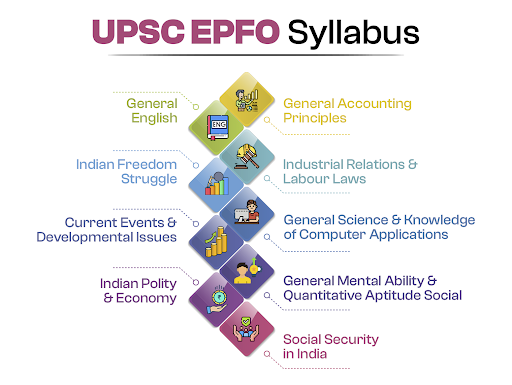Wanting to clear the UPSC EPFO exam in the first try is ambitious, but not impossible. Yes, the exam is tough and competitive, but you can do it. Yes, this exam is highly unpredictable and irregular, but there is a major chance of the notification dropping this year, and you can do it.
I am here to tell you that you can do it, not by giving you false hope, but by sharing everything you need to know about this exam, along with the UPSC EPFO syllabus, how much preparation time you need, and how you should prepare for this particular exam.
Let’s get started.
UPSC EPFO Exam Structure & Syllabus: Let’s Get a Complete Understanding
Before starting your UPSC EPFO preparation, it’s super important to know what the exam looks like and what topics you need to cover.
UPSC EPFO Exam Pattern
The UPSC EPFO exam has two stages:
- Recruitment Test (RT), where MCQ-based, objective-type questions are asked, for a total of 300 marks for 100 questions in total, which has to be completed in 2 hors, and every wrong answer will cost you 0.25 marks.
- Interview, in which only those who clear the written test will be asked to join. Final selection is based on merit in RT + Interview performance
Your main focus should be to score high in the written exam to qualify for the interview round.
UPSC EPFO Syllabus
The UPSC EPFO syllabus is broad but manageable if you plan well. Here are the main topics you need to study:
- General English
- General Science
- The last year of Current Affairs
- Indian Freedom Struggle & Cultural Heritage
- Governance and Constitution of India
- Indian Economy
- Industrial Relations & Labour Laws
- General Accounting Principle
- Social Security
- Computer Applications
- Quantitative Aptitude
- General Mental Ability
- Statistical Concepts
- Demographic Trends & Globalization
- Auditing Principles
- Insurance Fundamentals
Build a 6-Month Study Plan
You will have to build a timetable or a study plan. It should be for 6 months.
6-Month Plan (Ideal for Beginners):
- Month 1–2: Understand basics – start with Polity and Labour Laws
- Month 3–4: Add Accounting, Freedom Struggle, Current Affairs, and Quant
- Month 5: Start solving topic-wise MCQs, begin revision
- Month 6: Attempt full-length mock tests, revise short notes, polish weak areas
Resource List for Beginners
You don’t need 10 books per subject. Stick to 1 to 2 solid resources:
| UPSC EPFO
Books and Resources as per Subjects |
|
| Subject | Resources |
| General English | Objective General English by SP Bakshi |
| General Science | NCERT Science Books from Classes 6 to 10 |
| The last year of Current Affairs | Read newspapers and magazines |
| Indian Freedom Struggle & Cultural Heritage | Modern Indian History (11th to 12th classes) from NCERT and Indian Art & Culture by Nitin Singhania |
| Governance and Constitution of India | Political Science (9th to 12th classes) NCERT, and Indian Polity by M Laxmikanth |
| Indian Economy | Indian Economy (9th to 11th classes) NCERT, and Indian Economy by Ramesh Singh |
| Industrial Relations & Labour Laws | Industrial Relations and Labour Laws by Piyali Ghosh and from the website of the Ministry of Labour and Employment |
| General Accounting Principles | Introduction to Accountancy by S. Chand |
| Computer Applications | Computer Awareness by Arihant |
| Quantitative Aptitude | Quantitative Aptitude by Dr. R.S. Aggarwal |
| General Mental Ability | A Modern Approach to Verbal & Non-Verbal Reasoning by Dr. R.S. Aggarwal |
| Statistical Concepts | Statistics for Economics (11th class) from the NCERT |
| Demographic Trends & Globalization | Indian Geography (11th to 12th classes) from the NCERT, and Indian Geography by Ramesh Singh |
| Auditing Principles | Introduction to Accountancy by S. Chand |
| Insurance Fundamentals | JAIIB book for Paper 1 – Principles and Practices of Banking by Macmillan |
- Mock Tests: From various online platforms that provide free access.
- Previous Year Papers: Download from UPSC official website or from any authentic online platform.
Daily Routine and Time Management
Your schedule should depend on whether you’re a working professional or a full-time aspirant. Here’s a simple structure:
For Working Professionals:
- Morning (7–9 AM): Static subject (Polity, History)
- Lunch break (30 mins): Read Current Affairs
- Evening (7–9 PM): Practice MCQs
- Night (15 mins): Revise short notes
For Full-Time Aspirants:
- Study in 3-hour blocks with breaks in between
- Example:
- Block 1: 9–12 (Theory + Notes)
- Block 2: 2–5 (MCQs + Concept clarity)
- Block 3: 6–8 (Revision + Current Affairs)
Focus on Concept + Practice + Revision
Reading is only step one. Real retention comes from solving and revising.
- For every 2 hours of study, do 30 mins of practice
- Begin revision from Week 2 – don’t wait till the end
- Keep short notes – 1 A4 sheet per topic
- Use Sunday as weekly revision day – review what you studied the whole week
- Analyze mock tests carefully — mistakes teach you more than correct answers
Smart Preparation for Interview
If you score well in the written test, the interview stage becomes crucial.
Start preparing once you feel confident about the written round. Focus on:
- EPFO’s mission, role, and latest reforms
- Basic knowledge of social security and labour schemes (like ESIC, NPS, PM-SYM)
- Personality-based questions:
- Why do you want to join EPFO?
- What do you understand by “social justice”?
- How can you contribute to EPFO?
Practice mock interviews if possible. Speak clearly, dress smartly, and stay calm.
Common Mistakes to Avoid
- Don’t run after too many resources, focus on finishing 1 book well
- Don’t ignore previous year question papers, they show real exam trends
- Avoid depending solely on coaching; most of the UPSC EPFO can be done through self-study
- Don’t skip current affairs, especially labour laws, social security, and budget-related news
- Lack of revision is a big red flag; revise weekly
Final Words
Cracking the UPSC EPFO exam isn’t about being a topper, it’s about staying consistent.
- You don’t need 12 hours a day. 4 to 6 focused hours are enough
- Make a study journal or tracker
- Don’t get discouraged by setbacks, just restart
- Your first attempt is your cleanest shot, make it count
Start today. One chapter at a time. You’ll be glad you did.



